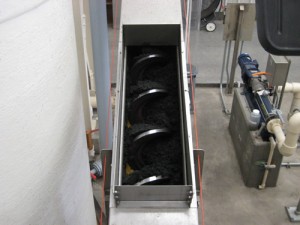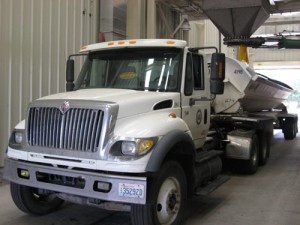Biosolids
What happens to the materials that disappear down our drains and storm sewers?
In our modern society it’s easy to think “out of sight is out of mind”; that waste miraculously evaporates once it has vanished into the pipeline. Early humans knew better. Agrarian societies have been using both human and animal waste to fertilize the land for as long as humans have planted seeds. And those seeds have been thriving. The materials that wash down our drains are not a waste: they’re a valuable, age-old resource for enriching the soil.
Our modern wastewater treatment facilities are not only water cleaning systems, but they are also reclamation factories that produce safe, reusable solids-biosolids. Recycling wastewater solids for beneficial use is gaining acceptance worldwide and encouraged by the U.S. Environment Protection Agency (EPA), the U.S. Department of Agriculture, the U.S. Food and Drug Administration, and the National Association of Conservation Districts. Most important, these recycling efforts put valuable resources back where they belong-in the natural cycle.
What are Biosolids?
Biosolids are the nutrient-rich processed organic material derived from wastewater treatment. The variety of substances in the wastewater determines the composition of the solids and can include domestic wastes, industrial discharges, chemical in the water supply, and stormwater. At the treatment plant, wastewater is first separated into settled solids and liquid effluent. Various processes treat, stabilize, and disinfect the solids, destroying harmful bacteria and reducing odor. Such processes produce a myriad of products. These products can take the form of humus-like organic matter, dry powder, pellets, slurry or liquid and bear little resemblance to the raw solids from which they were derived.
Biosolids Facts
Properly managed biosolids help protect surface water or groundwater. Biosolids recycling programs follow best management practices to ensure water quality is protected. In fact, documented improvements in surrounding water quality have been found in numerous biosolids application projects due to enriched soils, vigorous growth of vegetation that reduce soil erosion and stabilize contaminants that had previously contributed to stream and groundwater pollution. Biosolids recycled on agriculture land provide essential plant nutrients such as nitrogen, phosphorus, and zinc for healthy crops. Biosolids promote root growth by improving soil tilth, enhancing moisture retention, and enhancing earthworm production. Biosolids supply organic matter that often improves yield. Enhanced yield and moisture retention both help control soil erosion. Recycling biosolids can play an important role in soil fertilization and conservation.
Please click on the links below for more information:
http://www.nwbiosolids.org
http://www.biosolids.org
http://www.wef.org
Questions? Please contact:
Daryl Bullard
Biosolids, Chief Operator
(509) 249-6871


